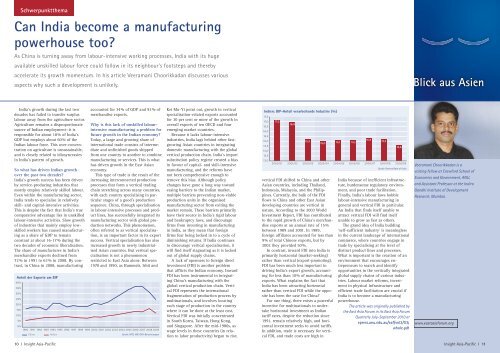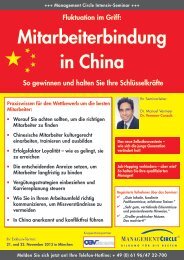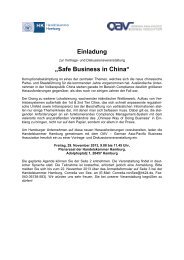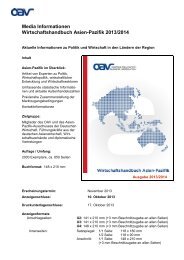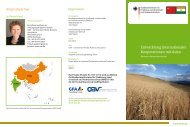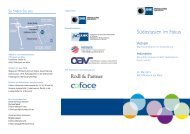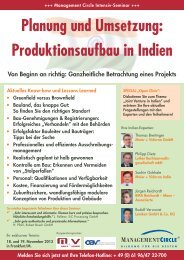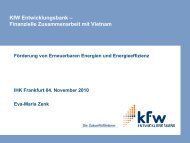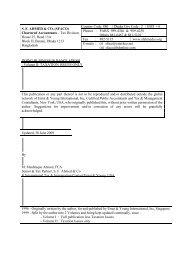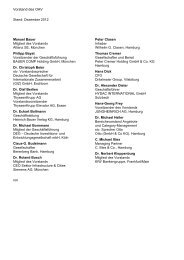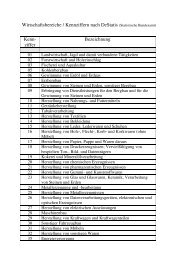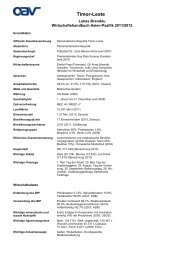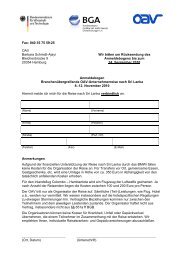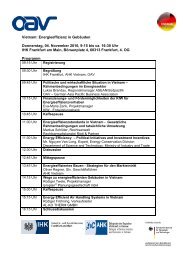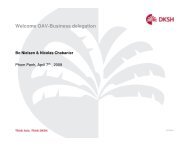Blick aus Asien
Blick aus Asien
Blick aus Asien
Sie wollen auch ein ePaper? Erhöhen Sie die Reichweite Ihrer Titel.
YUMPU macht aus Druck-PDFs automatisch weboptimierte ePaper, die Google liebt.
Schwerpunktthema<br />
Will Euro problems hurt Asian<br />
monetary integration?<br />
Whereas the Euro was on the brink of faltering, Asia is contemplating increased financial<br />
integration: Financial markets are becoming more open, the Chiang Mai Initiative has been<br />
multilateralised and China has once again unpegged the Yuan from the US-Dollar. Andrew<br />
Sheng takes a look at lessons Asia can learn from Europe’s difficulties and further steps to<br />
be taken for regional financial cooperation.<br />
<strong>Blick</strong> <strong>aus</strong> <strong>Asien</strong><br />
At the 10th Anniversary of the Euro’s<br />
launch in 2009, there were some sugges -<br />
tions that one-day the Euro might even<br />
take over the role of the US dollar as the<br />
dominant reserve currency. After all, the<br />
US dollar had been depreciating due to<br />
the subprime crisis against the Euro. Less<br />
than a year later, the Euro is sliding as a<br />
result of the Greek debt crisis.<br />
Doubters are now pointing to a political<br />
and structural crisis of the Euro,<br />
and focusing on the need for stronger<br />
fiscal discipline. The Maastricht Treaty,<br />
that led to the creation of the euro area,<br />
was unable to bind the euro area members<br />
to fiscal discipline. If even the<br />
uber-fiscally conservative Germany<br />
could not meet the limits of 3% of GDP<br />
fiscal deficit due to the high costs of<br />
funding the re-unification of Germany,<br />
why should the smaller states adhere<br />
to the Treaty?<br />
The structural flaw of the Euro zone is<br />
that even though there may be a unified<br />
European Central Bank and a converging<br />
European financial supervisory system,<br />
there is no unified fiscal system. Thus,<br />
once a member country runs a large fiscal<br />
deficit, there is no central body to<br />
effectively coordinate fiscal policy.<br />
Proponents of Asian monetary integration<br />
point to growth in trade integration<br />
as a pre-condition for future<br />
financial integration. Those who think<br />
that Asian integration is a pipe dream<br />
say that there is currently no political<br />
consensus, not even the makings of a<br />
unified monetary or currency policy, and<br />
little convergence on supervisory policy.<br />
Further, there are hardly any discussions<br />
within Asia on common fiscal policies.<br />
The Euro problems are more warning<br />
signals to Asian reforms on what not to<br />
do and what to avoid, rather than positive<br />
indicators of the road to integration.<br />
But not all the lessons are negative. I can<br />
think of several ‘green shoots’ coming<br />
out of the Euro problems for Asia.<br />
The first is that you can’t hurry the<br />
process. It takes time to get consensus on<br />
what is right for a large community of<br />
different interests and different cultures.<br />
If you ask ten Asian economists on what<br />
they think the future of Asian integration<br />
is, I am sure you will get more than<br />
ten opinions. Common thinking is nonexistent,<br />
let alone common institutions.<br />
At least, European bureaucracies have<br />
been talking and bargaining with each<br />
other for more than 50 years through the<br />
centers’ of power in Brussels, Basel and<br />
Frankfurt.<br />
Secondly, talk about Asian monetary<br />
integration has always been defensive<br />
rather than offensive, in the sense that<br />
some pooling of resources (such as an<br />
Asian Monetary Fund) could hopefully<br />
defend weaker Asian currencies from<br />
excessive speculation and instability.<br />
The reason why multilateralisation of<br />
the Chiang Mai initiatives took quite a<br />
long time to arrange is that immediately<br />
follow ing the Asian financial crisis<br />
threats of instability receded, and thus<br />
there was little urgency to getting any<br />
agreement done. The problems of the<br />
Euro have given the Asian integration<br />
process more urgency.<br />
Thirdly, in the last decade, differences<br />
in country income and wealth levels<br />
have become less unequal. With Japan in<br />
the doldrums and the rise of China,<br />
India, Gulf states and East Asia-ex<br />
Japan; Asian countries are now more<br />
evenly matched. Ten years ago, Japan<br />
was the sole advanced country, but<br />
today, China, India, Korea and Indonesia<br />
are members of the G20. Seven of the<br />
Asia Pacific’s financial centres are<br />
amongst the top 15 in the world according<br />
to the City of London Global Financial<br />
Centre Index.<br />
Fourthly, the return of the RMB to a<br />
more flexible currency arrangement and<br />
the upward revaluation of the Asian currencies<br />
in recent months indicate that<br />
the financial markets are reflecting the<br />
shifting economic weight towards the<br />
East. Asia will be receiving more hot<br />
money flows and will have to cope with<br />
the same pressures that plagued East<br />
Asia in the early 1990s, just before the<br />
Asian financial crisis.<br />
Fifth, the official attitude towards<br />
more controls over the speculative barbar<br />
ians at the gate has changed, even as<br />
Germany unilaterally banned naked short<br />
selling and the IMF has acknow ledged<br />
that capital controls are part of the<br />
macro-economic toolkits. The balance of<br />
power between markets and the central<br />
banks in managing currency stability has<br />
tilted back towards central banks.<br />
None of the above positive signs add<br />
up to greater impetus for Asian monetary<br />
integration. Indeed, there is no sign<br />
that there is greater sense of regional<br />
cooperation, since Korea was also willing<br />
to put currency issues on the agenda of<br />
G20 in Toronto.<br />
Much will depend on how China plays<br />
her cards in the near future. Shanghai<br />
has already been designated as the international<br />
financial centre for China and<br />
the RMB is becoming an important trade<br />
currency, particularly with neighbouring<br />
countries. The sheer weight of excess<br />
savings in the surplus countries will<br />
clearly give Asian financial centers’ more<br />
clout in the recycling of global funds.<br />
What is not obvious is how Asian<br />
policy-makers are institutionalising the<br />
process.<br />
The process of Asian financial integration<br />
must depend first and foremost<br />
on the degree of deepening in Asian<br />
financial institutions. The process of<br />
creating diverse financial institutions has<br />
happened too slowly relative to the<br />
needs of the rising middle class and<br />
aging demographics. Asia has always<br />
prided itself on growth with relatively<br />
little financial repression, in the sense<br />
that depositors received only slightly<br />
negative real interest rates, with the<br />
benefits of repression given to the export<br />
and manufacturing sectors. In recent<br />
years, however, the rise of inflation has<br />
hurt the savers, but the benefits to the<br />
borrowers have been unevenly spread.<br />
Perhaps the next phase of Asian<br />
financial integration will be less officially<br />
driven, and more market led<br />
through the removal of the barriers to<br />
Asian financial institutions integrating<br />
Asiatisches Währungsnetzwerk<br />
Land<br />
Brunei<br />
China (+ Hongkong)<br />
Indonesien<br />
Japan<br />
Kambodscha<br />
Korea, Republik<br />
Laos<br />
Malaysia<br />
Myanmar<br />
Philippinen<br />
Singapur<br />
Thailand<br />
Vietnam<br />
Beitrag in Mio. USD<br />
30<br />
38.400<br />
4.552<br />
38.400<br />
120<br />
19.200<br />
30<br />
4.552<br />
60<br />
4.552<br />
4.552<br />
4.552<br />
1.000<br />
within the region. Allowing more Asian<br />
financial institutions into each others’<br />
domestic markets is more of a concrete<br />
step towards regional integration than<br />
visionary statements.<br />
Witness how Malaysia has allowed<br />
Chinese, Indian, Indonesia, Japanese and<br />
Middle East financial institutions into its<br />
home market. If this process accelerates<br />
and spreads, Asian financial integration<br />
will happen through the ramen bowl of<br />
inter-connected institutions. Note that I<br />
am not talking about spaghetti.<br />
The article has been published at<br />
www.eastasiaforum.org on July 5th, 2010<br />
Die Chiang Mai-Initiative geht auf einen<br />
Gipfel der ASEAN+3 Staaten (ASEAN sowie<br />
China, Japan und Südkorea) im Jahr 2000 in<br />
der thailändischen Stadt Chiang Mai<br />
zu rück. Ziel war – als Reaktion auf die <strong>Asien</strong>krise<br />
– die Bildung eines asiatischen Netzwerks<br />
bilateraler Währungs-Swap-Abkommen,<br />
um die Liquidität der Mitgliedsstaaten<br />
bei künftigen Krisen zu sichern. Im Zuge der<br />
weltweiten Finanz- und Wirtschaftskrise<br />
wurde 2009 beschlossen, die Initiative multilateral<br />
<strong>aus</strong>zurichten. Im März 2010 wurde<br />
entsprechend ein asiatischer Fonds in Höhe<br />
von 120 Milliarden US-Dollar eingerichtet,<br />
in den die beteiligten Länder mit unterschiedlichen<br />
Anteilen einzahlen. Schwergewichte<br />
sind China mit Hongkong, Japan und Korea.<br />
Diese großen Beitragszahler dürfen nicht<br />
mehr Geld <strong>aus</strong> dem Fonds entnehmen als<br />
sie eingezahlt haben. Die anderen Staaten<br />
dürfen ein Vielfaches ihrer Einlagen <strong>aus</strong>leihen<br />
– je nach zugeteiltem Multiplikator.<br />
Beitrag in Prozent<br />
0,025 %<br />
32,0 %<br />
3,8 %<br />
32,0 %<br />
0,1 %<br />
16,0 %<br />
0,025 %<br />
3,8 %<br />
0,05 %<br />
3,8 %<br />
3,8 %<br />
3,8 %<br />
0,8 %<br />
Multiplikator<br />
5,0<br />
1,0<br />
2,5<br />
1,0<br />
5,0<br />
2,5<br />
5,0<br />
2,5<br />
5,0<br />
2,5<br />
2,5<br />
2,5<br />
5,0<br />
Andrew Sheng is Adjunct Professor<br />
at the University of Malaya and<br />
Tsinghua University, Beijing.<br />
www.eastasiaforum.org/2010/07/05/willeuro-problems-hurt-asian-monetaryintegration/<br />
06<br />
I Insight Asia-Pacific<br />
Insight Asia-Pacific I 07


